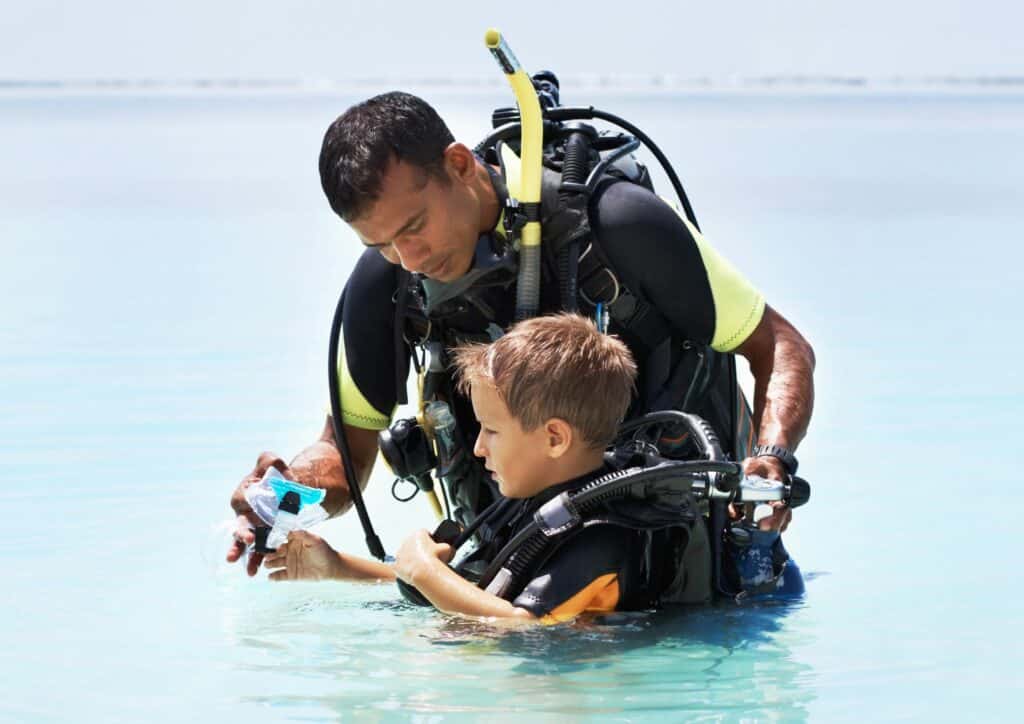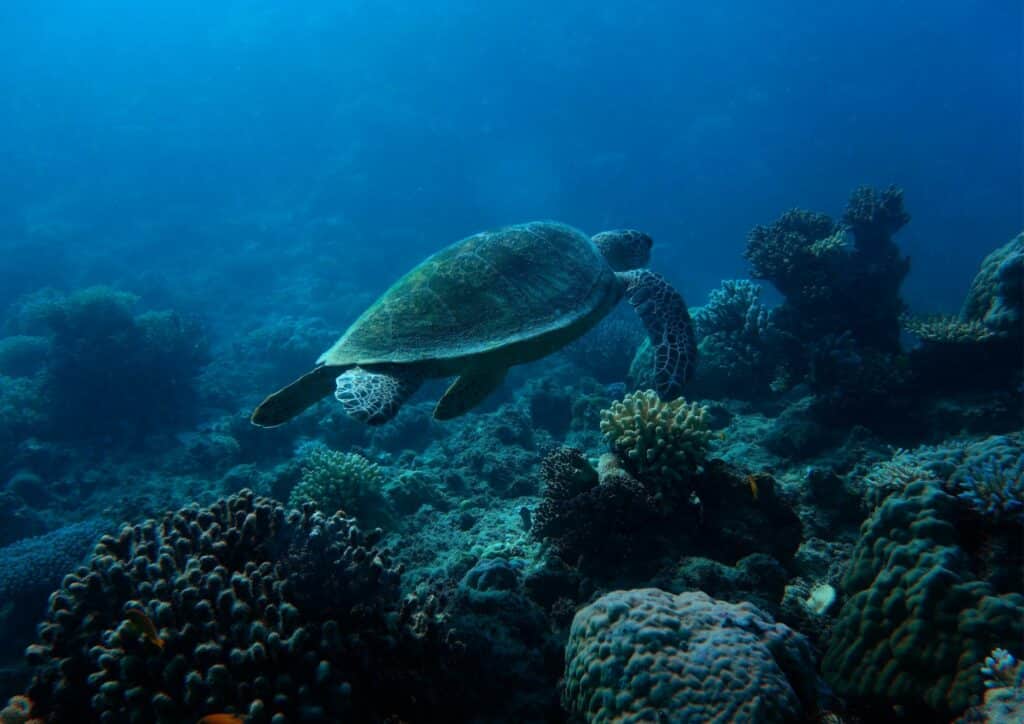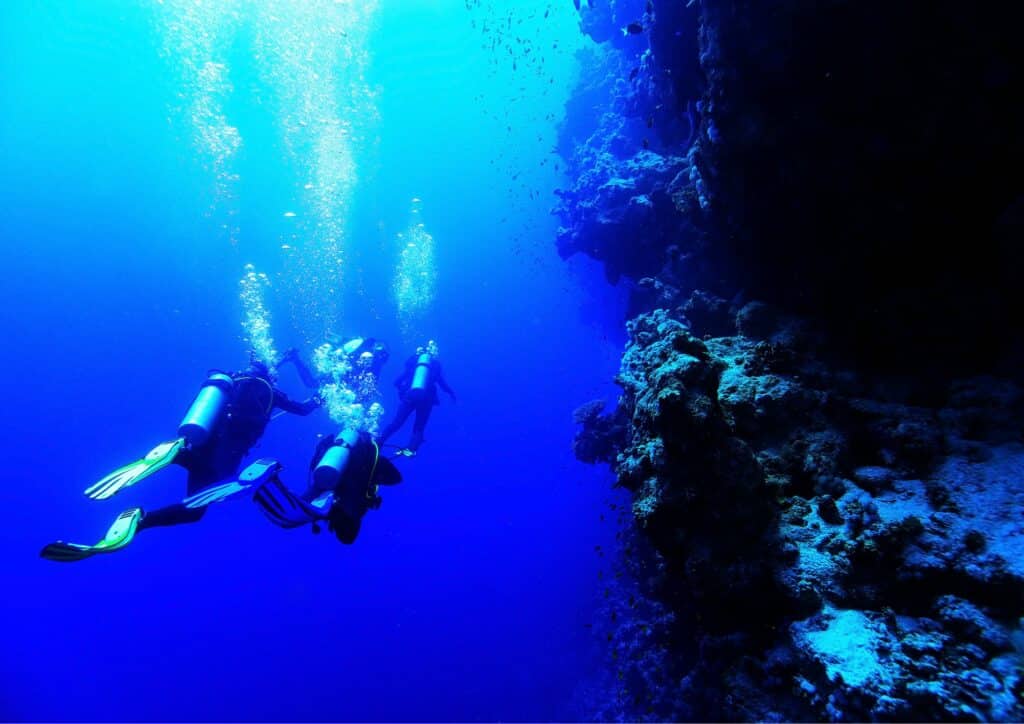Embarking on a Bali diving adventure is a dream for many, with its crystal-clear waters, vibrant coral reefs, and diverse marine life creating the perfect backdrop for scuba diving. When choosing to become a certified diver, two of the most prominent certification agencies come into play: PADI (Professional Association of Diving Instructors) and SSI (Scuba Schools International). Both agencies offer comprehensive Open Water courses, but they differ in various aspects. Here, we’ll compare PADI and SSI Open Water courses in the context of Bali diving to help you decide which path to take for your underwater journey.
Training Philosophy and Structure
PADI:
- PADI follows a highly structured and standardized approach to training.
- The Open Water course is divided into three main sections: Knowledge Development, Confined Water Dives, and Open Water Dives.
- PADI emphasizes a step-by-step learning process, ensuring that each skill is mastered before moving on to the next. This approach is ideal for those who prefer a clear, methodical progression.
SSI:
- SSI offers a more flexible approach to training, allowing instructors to tailor the course based on student needs and local conditions.
- The course structure includes Academic Sessions, Pool/Confined Water Sessions, and Open Water Sessions.
- SSI’s philosophy of “comfort through repetition” allows students to practice skills in various contexts, which can be beneficial in the diverse dive sites around Bali.

Learning Materials and Resources
PADI:
- PADI provides extensive learning materials, including manuals, videos, and a robust e-learning platform.
- The e-learning option allows students to complete the theoretical part of the course at their own pace before arriving in Bali.
- PADI’s comprehensive resources are available in multiple languages, catering to a global audience.
SSI:
- SSI offers a variety of digital learning materials through the MySSI app, which includes manuals, videos, and interactive quizzes.
- The app-based platform integrates learning materials, logbooks, and certifications, providing a seamless user experience.
- SSI’s flexible learning modules can be tailored to the student’s progress, making it easy to adapt to the unique conditions of Bali’s dive sites.

Instructor and Dive Center Requirements
PADI:
- PADI dive centers and instructors adhere to strict standards and undergo regular audits to ensure quality and safety.
- Instructors must renew their membership annually and complete continuing education requirements.
- PADI’s stringent standards ensure a consistent level of training across all its dive centers.
SSI:
- SSI also maintains high standards for its dive centers and instructors but offers more flexibility in how courses are conducted.
- Instructors are encouraged to personalize training, which can enhance the learning experience in Bali’s diverse underwater environments.
- SSI’s focus on instructor flexibility allows for a more customized approach to student needs.
Certification Process
PADI:
- PADI certifications require students to complete a set number of dives and skills in a specified order, culminating in a final written exam and practical assessments.
- The certification card is recognized worldwide, detailing the level of training received.
SSI:
- SSI certifications also require a set number of dives and skills, but instructors have more flexibility in conducting training.
- The certification process involves continuous evaluation rather than a final exam.
- SSI’s certification card, integrated with their digital platform, is globally recognized and easily accessible through the MySSI app.
Market Presence and Community
PADI:
- PADI is the largest and most recognized diving certification agency globally.
- Its extensive network of dive centers and instructors ensures widespread availability of courses.
- Strong emphasis on marketing and brand recognition makes PADI a household name in the diving community.
SSI:
- SSI is also highly respected and rapidly growing, with an increasing number of dive centers worldwide.
- Known for its strong community support and focus on building long-term relationships with students and instructors.
- SSI’s emphasis on digital integration and personalized training is gaining popularity among new divers.
Market Presence and Community For Bali Diving
Choosing between PADI and SSI for your Open Water course in Bali Diving ultimately depends on your personal preferences and learning style. Both agencies offer high-quality training that will prepare you for safe and enjoyable diving experiences. If you prefer a highly structured and standardized approach, PADI might be the better choice for you. On the other hand, if you value flexibility and a more personalized training experience, SSI could be the way to go.
Regardless of which agency you choose, Bali’s stunning underwater landscapes, from the vibrant coral gardens of Amed to the iconic USAT Liberty shipwreck in Tulamben, provide the perfect setting for your scuba diving certification. Dive into the adventure and discover the magic beneath the waves with Bali diving!

I’ve always been fascinated by Bali’s diving scene, and now I’m more convinced than ever to get certified with PADI or SSI. This summary provides a great insight into the differences between both agencies, making it easier for me to make an informed decision.
Dear Astrid Tan, Thank you for taking the time to read our blog summary on PADI and SSI Open Water courses in Bali. We’re thrilled that you found it helpful in your decision-making process. At Gill Divers, we understand the importance of choosing the right certification agency for your diving journey. Both PADI and SSI are reputable organizations with their own strengths and weaknesses. If you have any further questions or concerns about the Open Water courses, please don’t hesitate to contact us at Tel: +65 6734 9373 or Email: [email protected]. We’re always here to help. Good luck with your certification process!
This summary has given me food for thought! I was leaning towards PADI, but now I’m not so sure. Perhaps a mix of both agencies’ strengths would be the best approach?
Hi Yvonne, thanks for sharing your thoughts! We’re glad that our summary has given you food for thought. You’re absolutely right; both PADI and SSI have their strengths, and it’s not uncommon for divers to choose a mix of certifications to suit their needs. At Gill Divers, we respect your decision-making process and encourage you to research further to make an informed choice. If you have any questions or concerns, feel free to contact us at Tel: +65 6734 9373 or Email: [email protected]. We’re here to help you on your underwater journey.
I’ve always wanted to go diving in Bali! This article is really helpful for someone who’s planning their first dive. I didn’t know there were so many differences between PADI and SSI.
Hi Yasmin Tan, thank you for your interest in our Bali diving adventure! We’re thrilled to hear that our article has been helpful in planning your first dive. Both PADI and SSI are reputable certification agencies with comprehensive Open Water courses. At Gill Divers, we offer training programs from both organizations, so whether you choose PADI or SSI, you can be assured of a high-quality diving experience. If you have any more questions or would like to discuss your options further, please don’t hesitate to contact us at Tel: +65 6734 9373 or Email: [email protected]. We’re always here to help.
As someone who’s been diving in Bali before, I can attest that the waters are indeed crystal-clear. The comparison between PADI and SSI is spot on – I think I might opt for SSI this time around.
Thank you for sharing your diving experience in Bali, Kavin! We’re glad to hear that our comparison of PADI and SSI Open Water courses was spot on. If you have any questions or concerns about the certification process or would like more information on our SSI course offerings, please don’t hesitate to reach out to us at Tel: +65 6734 9373 or Email: [email protected]. We’d be happy to assist you in making an informed decision for your underwater journey.
I’m a certified diver through PADI, but I’ve heard great things about SSI too. It’s good to know that both agencies offer similar courses. I might consider taking an SSI course for my next certification.
Hi Ahmed Razak, it’s great to hear that you’re already a certified diver through PADI! Both PADI and SSI are reputable agencies with similar courses, which is fantastic for divers looking to switch or try out another certification. If you do decide to take an SSI course for your next certification, we’d be happy to help you with any questions or concerns. You can reach us at Tel: +65 6734 9373 or Email: [email protected]. We’re here to support your underwater journey!
As a beginner, it’s overwhelming to choose between PADI and SSI. But this article really breaks down the differences and helps me make an informed decision. Thanks for sharing!
Hi Evelyn, thank you for sharing your feedback with us! We’re thrilled to hear that our article helped you make a more informed decision about choosing between PADI and SSI. At Gill Divers, we believe that education is key to making the most out of your diving experience in Bali. If you have any further questions or concerns, please don’t hesitate to reach out to us at Tel: +65 6734 9373 or Email: [email protected]. We’re always here to help.